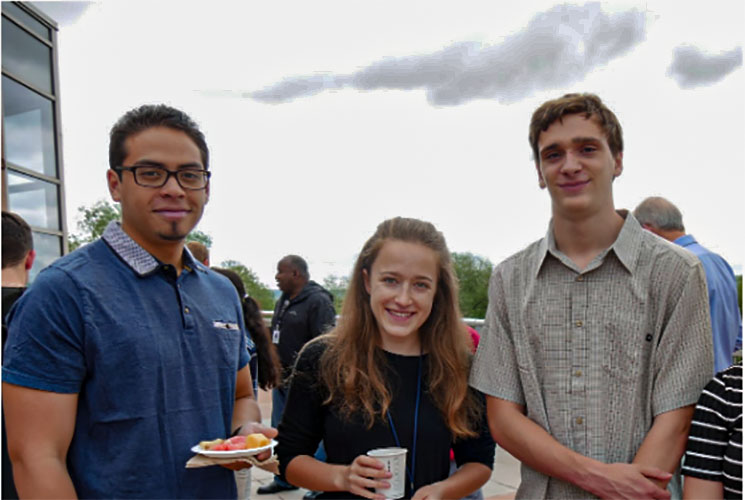
Braedon Guenther (right), had the opportunity to meet interns hailing from across the country during his time at NOAA. photo courtesy of NOAA
Three TJ Spartans spent the summer interning at the National Oceanic and Atmospheric Administration in Boulder.
Though summer vacation is often hallmarked by the toil of summer jobs, the torpor brought on by the blazing sun, and the monotony that comes with having three months free of obligation, Thomas Jefferson students Pana Reiva (senior), Braedon Guenther (junior), and Ava Ward (junior) created a summer to remember when they interned at the National Oceanic and Atmospheric Administration (NOAA) this past summer. Through Denver Public Schools’ Career Connect—a program that places high schoolers in engaging internships around the state—Reiva, Guenther, and Ward had the opportunity to spend over 120 hours at the Boulder institute, learning from some of the country’s most acclaimed environmental scientists.
An American scientific agency within the United States Department of Commerce, NOAA focuses on the conditions of the oceans, major waterways, and the atmosphere. The administration’s three tenants—science, service, and stewardship—drive the employees to understand, conserve, and manage the environment and its resources. Guenther and Ward, both pursuing pathways in TJ’s Center for Communication Technology Magnet program, were able to work with NOAA’s Systems Administration and Office of the Director. Reiva, a member of DECA, got to see the business side of the federal entity.
“Everyday was different. I could go to meetings and sit in on the communications division or I could go to brown bag lunches to learn about the different career paths the scientists took to get to where they are today,” Reiva enthused. “By far the best part of the internship was being able to have the opportunity to learn so many new things.” Aside from their assigned projects, the interns were taken to various lectures where they listened in on some of the NOAA scientists’ latest endeavors, such as controlling contraptions that can decontaminate air and studying correlations between pollution buildup and factory locations. Due to scientific and governmental procedures, the discoveries presented at the lectures are often explored for years before they are officially presented. “One thing that struck me, in particular, was when I found out that a scientist I had recently met had made a discovery that had a huge impact on the entire world, yet the general public knew very little about his discovery and even less about him,” Guenther noted.
Becoming a NOAA scientist may not be the fast-track to fame, but it can certainly lead to an engaging and fulfilling career. “Having the opportunity to work among some of America’s greatest environmental scientists was eye-opening,” said Reiva. “It is truly an amazing experience to hear about the projects that they are passionate about.” With climate change being one of the most pressing issues in the world today, environmental science has become a discipline that is crucial to the sustainability of our future. Knowing that their work could be forestalling an environmental apocalypse pushes all NOAA employees, no matter what their position, to give 110% to every task they are assigned.
The most extraordinary aspect of NOAA may not be its revolutionary technologies or groundbreaking discoveries, but rather the kindness granted by every employee of the federal institution. Given three complete novices to the sciences of the oceans and atmospheres, the NOAA staff did not hesitate to patiently guide their interns through the experience. They willingly shared their knowledge with the Guenther, Reiva, and Ward, and when a mistake was made, they offered only encouragement and instruction as a consequence. “Everybody on the NOAA campus was a really great person,” said Guenther.
Despite the eminence of the staff and magnificence of the facility, the internship was not all fun and games. “Every workplace has different obstacles you have to overcome,” Reiva stated. “The biggest one for me was understanding the science part of the field. At NOAA, they develop research from the bottom of the ocean to the top of the atmosphere. For someone who is not a big science person, it was definitely difficult to understand the concepts and ideas.” Fortunately, all of the questions formed by the interns during their time at NOAA can guide them towards further discovery outside of the job, strengthening their critical thinking skills. Guenther found himself wishing for more time at the administration. “Figuring out how to manage my time in a way where I could get all of these tasks done in a timely manner was my biggest struggle,” he remarked. As the Career Launch internships are only 120 hours long, the students had to make sure that every second they spent in Boulder was productive.
No matter what career they choose to pursue in the future, the TJ interns are confident that they will always use what they learned at NOAA. “It was a valuable way to spend my summer and I would recommend that other kids take advantage of the Career Connect opportunity,” urged Guenther. The experience gained in Career Connect internships is invaluable, and, to sweeten the deal, those who complete all 120 hours of their internship have the opportunity to earn up to $1,200 as a grant from Denver Public Schools. “No matter what your dreams are, there are always different paths that can take you to different places you never would’ve imagined yourself in,” Reiva counseled. There is no doubt that departments like NOAA and programs like Career Launch are fostering a brighter future in today’s teens. By developing accountability, curiosity, and confidence in young minds, they are creating an innovative generation that could revolutionize the world.